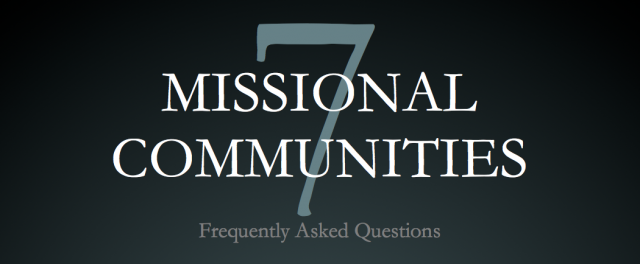Question 5: How do you Train Missional Community Leaders?

You can download a PDF of this post here: PDF
How do you train missional community leaders?
Developing and training leaders for missional communities begins with cultivating a discipleship ethos. We need to look at discipleship holistically, beginning with those who have yet to self-identify as Christians, and then all the way across the continuum to those who are serving the community from the overflow of their walk with God. Often the best leaders for missional communities are those who have yet to become Christ followers, the people of peace that God connects us with as we live our mission day to day.
Robert Webber in Journey to Jesus explores The Apostolic Tradition of Hippolytus, which was penned around 215 A.D., as the church was connecting with a world unfamiliar with the God of Abraham, Isaac and Jacob. From this document, we learn the church developed a holistic approach to discipleship at every stage of development. They identified four specific phases of development from the seeker to the hearer to the kneeler to the faithful.
Their discipleship began with those who had no faith – the seeker, and continued toward those who were using their gifts and talents to continue the mission – the faithful. When it comes to training and developing leaders, I have adapted this pre-modern paradigm to our postmodern, post-Christendom context, through the lens of the five equippers that the Apostle Paul mentions in his letter to Ephesus. Here is the basic discipleship continuum that we use.
Within this holistic approach to discipleship, when it comes to discipling or training the servant(s), we take an Orient, Involve and Equip approach. In other words, training missional community leaders is a process, not a program, and it takes place within the context of engaging in God’s mission. Discipleship takes place when we are “with people†like Jesus was with the 12, and it becomes personal and powerful in the informal daily rhythms of life. It’s about being vulnerable, and being open about our brokenness.
Discipleship is learning to call out what the Holy Spirit has put in people. It involves ministering together, praying together and studying the scriptures together. It is about encouraging, comforting and challenging one another. Discipleship takes place communally – in our personal space (4 to 12 people) as well as one-on-one.
It is about reflecting and refocusing. It’s learning to ask the right questions, and taking the time to listen to what God is doing in the person and through the person. It is walking beside them as they develop practical assignments (with deadlines), for further growth based on what God is doing. Training involves resourcing people theologically and practically so they can embody the good news contextually in every area of their lives.
It’s about being with and for people in hard times, praying for and with them, and falling in love with Jesus all over again. Training takes place more often in the living room and the streets, than in the classroom and the sanctuary. Training is ultimately about helping people follow Jesus in the concrete realities of life, for the sake of the people group or neighborhood to whom you are seeking to bring God’s blessing.
JR Woodward is a dream awakener and co-founder of Kairos Los Angeles, a network of neighborhood churches in the Los Angeles area. He serves on the East Hollywood Neighborhood Council as well as on the board for the Ecclesia Network and GCM. He founded [nlcf] a church at Virginia Tech, and The Unembraced, a ministry to orphans in the Turkana region of Kenya. He is also the co-founder and director of The Solis Foundation that awards micro-grants to help start small businesses in Kenya. JR enjoys coaching and consulting with a number of churches and church planters. Twitter: @dreamawakener.
================================
Join in the Conversation
Does JR’s model of discipleship and training challenge you? How? What do you like about the phases of development? Join the conversation in the comment section below…



